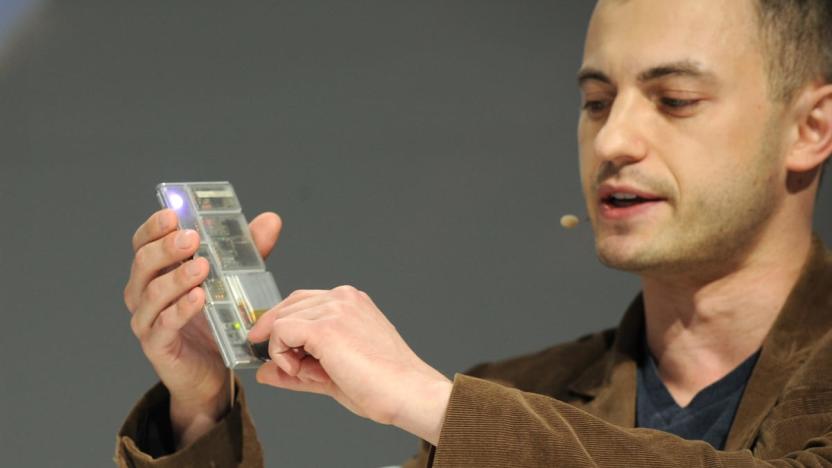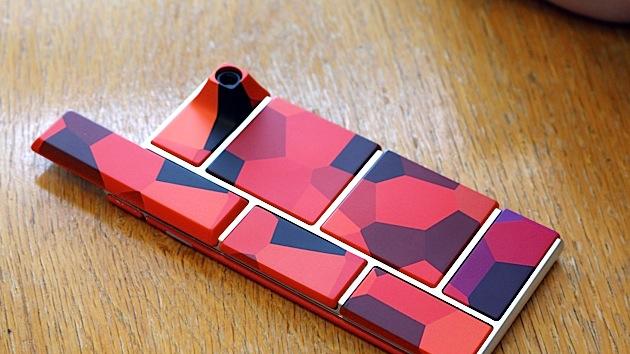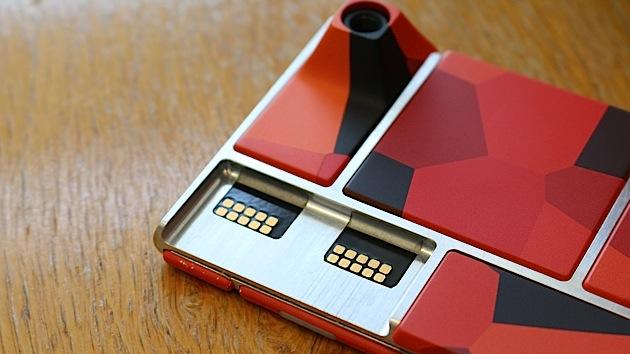modular
Latest

Project Ara will 're-route' market pilot for its modular smartphone
After going a while between updates, Project Ara has sent out a confusing series of tweets suggesting plans for the modular smartphone could change. We don't know if this has anything to do with the recent Google / Alphabet restructuring, but its official Twitter account says the team has been busy "making stuff", and that details on a "Market pilot re-route" are coming soon. We were expecting to see the Google-backed platform debut in Puerto Rico, but that is no longer a certainty. The account finished up by saying "this is not a goodbye" to the island, and left us awaiting further updates next week. Given recent events, we guess it's good to know the lights are still on, but anyone waiting for the chance to piece together their own smartphone will have have to stay tuned. [Image credit: Bryan Bedder via Getty Images]

'I Dream of Wires' synth documentary is streaming on Netflix
Looking to learn about the history of modular synthesizers? The documentary I Dream of Wires serves as a primer and it's now streaming on Netflix in the US. If you don't happen to live in the States, the film from Robert Fantinatto and Jason Amm is also available on-demand from Vimeo and for purchase over at iTunes. Featuring interviews with Trent Reznor, Gary Numan and others, the documentary focuses on "exploring the passions, obsessions and dreams" of those who are smitten with the instruments. Sounds like some solid weekend viewing if you ask us. [Image credit: Mark Venema/Getty Images]

Pretend you have Project Ara with this modular smartphone case
As awesome as Project Ara is, we've yet to hear a solid timeline nor pricing info for Google's ambitious modular smartphone. But we bring you good news: For those who lack patience and want to try the next best thing, you may want to consider the Nexpaq, a modular case for the iPhone 6, Galaxy S5, Galaxy S6 Edge and many more devices to come. Admittedly, we were a bit skeptical with this project's claim upon receiving the startup's pitch, but after meeting two of the co-founders in Hong Kong, we know they mean business.

AIAIAI's TMA-2 modular headphone lets you design the perfect pair
AIAIAI makes headphones (mostly). Historically, the Danish company has struck a good balance between understated cool, and audio quality (for the price of admission). The popular TMA-1 series spawned a few variations aimed at different use cases, such as a DJ model, and a Studio pair (and some special editions). Today, AIAIAI introduces The TMA-2. This isn't a sequel though, it's a rethink: break all the different editions up into parts; let buyers combine the bits they want to create their perfect set.

Here's what Project Ara phones will actually look like
Sure, we've seen prototypes of Google's Project Ara before, but these dummy modules from budget phone maker Yezz mobile are as good a hint to how the phone might actually look in real life. We already saw how Google envisioned Ara to look, but given its plans for a store where you'll be able to browse different components for your phone, it's unlikely things will be that uniform. It doesn't take much to imagine that Ara's customizable nature will mean all the different clip-in components will rarely be an aesthetic match. That's to say, your phone is likely going to be a patchwork of colors and designs, so why not embrace that and go all in? Yezz's prototype modules show us how that future will look.

Sling TV's success, selfie brushes and other stories you might've missed this week
This week has been a doozy: We got an update on Google's Project Ara, learned about the possible future of television from our Best of CES winner, watched a Beachbot draw Disney characters on the shoreline, oh, and did we mention our hands-on with a selfie brush? (C'mon, you know you're at least a little intrigued.) Details on all these things and more could be yours -- simply read on past the break.

Google plans to let you design your own Project Ara phone with an app
OK, so far we know that Project Ara's Spiral 2 prototype is in good shape, Spiral 3 should be even better, and that devices will hit Puerto Rico before anywhere else. Now we turn our attention to how you'll configure your very own Ara device, a decidedly incomplete process that Google's Jason Chua demoed using an as-yet incomplete Ara Configurator app.

Google details Ara Manager app for wrangling all your modules
We've known that there'll be an Ara Manager app to help Android users grok their shiny, new modular toys, but we've just gotten a better sense of how it'll actually work when Ara devices trickle into the wild later this year. At its most basic, the app -- which should come pre-loaded on Ara phones -- allows users to lock and unlock the modules currently slotted into the phone by using a bit of current to disengage the electro-permanent magnets holding them in place. We knew that already, though: What's new?

Google isn't the only one making a modular smartphone
It looks like Google's modular Project Ara smartphone has some fresh competition. Circular Devices has been working on the Puzzlephone, a simpler take on Android phones that you can upgrade yourself. Instead of letting you replace things piece-by-piece, it divides parts into "the Brain" (core electronics and camera), "the Heart" (battery and secondary tech) and "the Spine" (LCD, speakers and basic shape). It's not as flexible as Ara, but it promises a sleeker design that still includes real futureproofing; you can swap in a new module when you want a faster processor, a fresh battery or new features. The goal is to have a base phone that can last for 10 years, rather than two or three.

New Project Ara rival promises a modular phone with a focus on security
Project Ara isn't the only modular phone to look forward to anymore: it now has a fledgling rival in Vsenn, a startup co-founded by a former Nokia Android X program manager... at least according to its website. The project's so new, all its details can fit in a splash page at this point, though it has revealed enough to give us a decent idea of what it's about. Unlike Google's Project Ara, which has many swappable components, Vsenn will only have three -- the camera, the battery and the processor/RAM -- along with a replaceable back cover similar to those old Nokia brick phones. The phone will apparently come with three layers of encryption, though, as well as free access to a VPN network and a secure cloud service. Finally, the device will run vanilla Android with four years of guaranteed updates. We'll make sure to let you know when we hear more about the project. Or you can follow Vsenn's Twitter account, where the startup has divulged that its first model will have a 4.7-inch full HD screen, for more updates.

Five questions for the creator of Google's modular smartphone
It's been just over a year since Google's Advanced Technology and Projects (ATAP) division announced Project Ara, a full-scale effort to produce the world's very first modular smartphone. The team has been working hard and fast to get a unit on the market before the end of its two-year mission, and it's progressing quite nicely: We recently saw a functional "Spiral 1" prototype running on Android, and the next version -- "Spiral 2" -- should be getting into developers' hands later this year. Paul Eremenko, who heads up the Ara team, will be onstage at Engadget Expand with me for a live demonstration and fireside chat. We'll catch up on how things are progressing, how Ara has evolved since its inception, the most interesting use cases for a modular smartphone he's seen so far and also discuss the next Developer Conference, scheduled for January 14th, 2015, in Mountain View, California. In anticipation of his appearance at Expand, I reached out to Eremenko for a quick Q&A about Ara.

Barely Related: Marvel movie madness, Harry Potter can rap
Happy Halloween, everyone! Stay safe and have fun. Welcome to Barely Related, a conversational Friday column that presents the non-gaming news stories that we, the Joystiq staff, have been talking about over the past week. And no, we're not stopping our focus on industry and gaming news. Think of this as your casual weekly recap of interesting (and mostly geeky) news, presented just in time to fill your brain with things to discuss at all of those weekend shindigs. Grab a fresh drink, lean back in your armchair, and get ready to talk nerdy with us.

Project Ara team shows a working modular phone
You'd be forgiven for being skeptical of Google's Project Ara -- for all the prototypes and partnerships, actually spotting a working unit has been a gigantic challenge. You won't have to jump through hoops to see one after today, thankfully. The engineering team at NK Labs has shown Phonebloks a real, honest-to-goodness functioning test phone that boots into Android. It's using an old Jelly Bean release instead of the promised Android Lollipop build, and the demo doesn't include a significant amount of functionality, but hey -- progress!

Blocks' modular smartwatch will talk to your iPhone
Blocks first unveiled its modular smartwatch with a plan to use Android Wear, much as Project Ara smartphone will use a special version of Android. However, there has been a change of plans -- and it's good news if you're not of the Google persuasion. The team now says that it's using a version of the open source Tizen platform that should support Android, iOS and Windows Phone, so you probably won't have to give up a favorite device just to try this out. The Blocks team also has access to Intel's newest processors thanks to a prize from a recent design challenge, and modules will have removable covers that let you change both the style and functionality of your wristwear. This is still an incredibly ambitious project that may not pan out as planned, but it's evident that the pieces are quickly falling into place.

Google's modular phone gets cheaper thanks to a new processor
One of the biggest challenges behind Google's modular Project Ara phone platform has been getting processors to play nicely with the technology. How do you let someone swap out the very heart of their device as easily as they would a memory card? By creating a CPU for that very purpose, that's how. Rockchip has started work on a system-on-chip with modular tech built-in; your phone won't need any bridge chips or other special tricks to let you switch processors on a whim. You won't see the hardware in action until a Rockchip-based Ara prototype arrives in early 2015. However, the plans show that Google's vision of a completely upgradable handset is both feasible and potentially inexpensive. Don't be surprised if some of the earliest Ara phones (or rather, their parts) easily fit within your budget.

As your kid grows, this bike will transform to fit them
Like clothes, children tend to outgrow bikes pretty quickly. But what if there was a way to buy one and have it convert to fit a growing kid? Well, that's just what designer Andreas Bhend has done with the Miilo bike. What starts has a simple scoot along option with no pedals can adapt to fit an older child by flipping the frame and adding pedals. The handlebars and seat are also meant to adjust so that the bicycle can remain an option riders between the ages of 2.5 and 7 -- unless your kid hits a crazy growth spurt, of course. The project was inspired by another training bike that Bhend made by hacking up a pair IKEA stools, and from there, the idea to have a model that transforms began.

Google prepares modular phone dev kits (but your idea had better be good)
If you're a developer eager to start tinkering with Google's Project Ara modular phone technology as quickly as possible, it's time to get in line. The company has started taking requests for test boards; if you fill out the form before July 18th and meet Google's expectations, you could have (very) early hardware in your hands before the end of the month. Latecomers can get in on a second wave if they sign up no later than August 18th. Just don't assume that you can pick up a kit purely out of curiosity. Google is prioritizing the board requests based on your know-how and the "strength" of your proposed module concept -- it wants signs that there's a real device in the works. You'll have to sit tight if you're simply a fan of the build-your-own-phone concept, then, but it's apparent that Project Ara is quickly becoming a tangible reality.

Blocks' modular smartwatch concept is ambitious to a fault
As one of the Blocks smartwatch team reminded us today, modularity has played an integral role in modern computing. A desktop PC is only a collection of components, after all, which can swapped out and upgraded based on what you need from that particular machine (a process Razer hopes to simplify with Project Christine). Recently, Google and others have been working out how to bring the same level of customization to the smartphone. With smartwatches and fitness trackers a burgeoning tech category, both in terms of consumer interest and product development, the Blocks team sees no reason why wrist-worn technology can't benefit from being modular, too. It's in the process of creating such a gadget and today we caught up with the team at a London event, hosted by the Bluetooth Special Interest Group, to talk about its progress and check out an extremely early prototype.

Samsung launches a flexible platform of sensors for wearables
At Samsung's "Voice of the Body" event today, the company announced SIMBAND, a modular reference platform for wearable health sensors that it hopes will inspire a new generation of fitness products. The prototype device you see above has a multitude of sensors built right into it, including an optical light sensor that can detect the variation of light absorption through the skin in order to come up with your pulse and other data. There's even an ECG sensor integrated into the watchband so that when you touch the clasp, an electrical route is completed.

Here's how Google's modular phone will get its 3D-printed parts
Google's modular Project Ara smartphone is all about customization, but that creates a challenge: how are manufacturers supposed to build so many uncommon (and possibly unique) parts? The crew at 3D Systems is more than happy to tell you -- it just outlined the 3D printing techniques it's using to make Ara a reality. The company is dropping the conventional printing process, which bogs down due to frequent changes in speed, in favor of a continuously moving system that's fast enough to cope with mass production. The technique should generate "millions" of parts, even when some components need special treatment.










